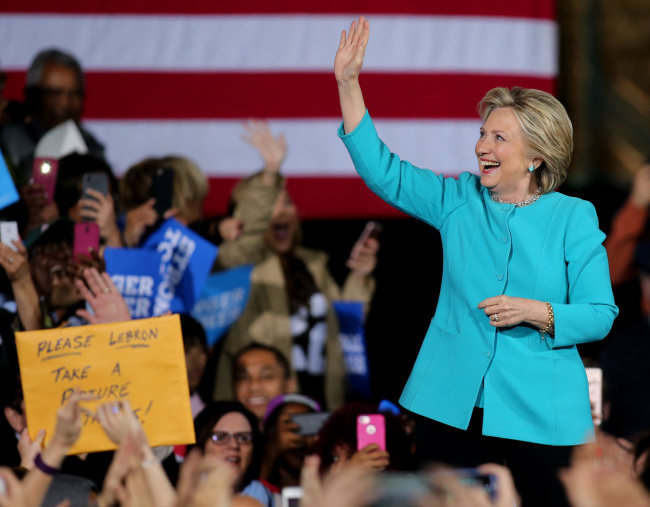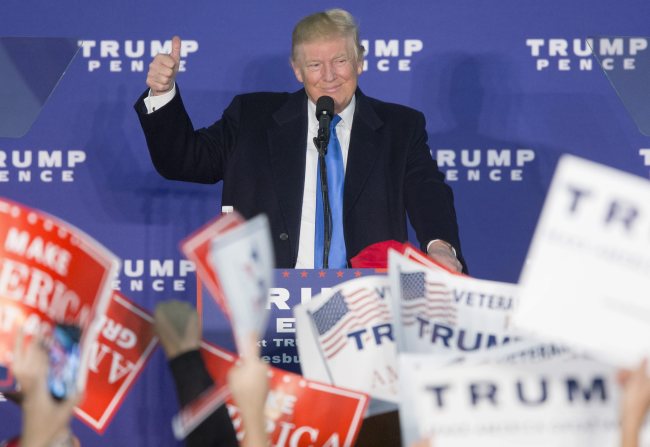With American voters poised to cast ballots to pick their next president Tuesday, Seoul officials are gauging the election’s potential impact on high-stake issues such as bilateral alliance, the US policy on North Korea, regional security and trade.
Throughout the campaign trail, Democratic candidate Hillary Clinton has in general maintained a slight edge over Republican nominee Donald Trump. In the final NBC News-Wall Street Journal poll, Clinton garnered 44 percent of likely voters and Trump 40 percent, whereas the latest ABC-Washington Post survey showed Clinton with a five-point lead at 48 percent.
Throughout the campaign trail, Democratic candidate Hillary Clinton has in general maintained a slight edge over Republican nominee Donald Trump. In the final NBC News-Wall Street Journal poll, Clinton garnered 44 percent of likely voters and Trump 40 percent, whereas the latest ABC-Washington Post survey showed Clinton with a five-point lead at 48 percent.

Yet given the close race, the possibility of Trump’s win cannot be ruled out, and his presidency would likely amplify uncertainties, in particular over the US’ Asia policy and posture toward the Korean Peninsula, experts say.
The real estate magnate has accused Seoul of “free riding” on Washington for its defense, demanding it shoulder greater financial burden or better provide for its own security, such as by attaining nuclear weapons. He has also described a South Korea-US free trade pact as a “job killer” and vowed to pull out of the 12-nation Trans-Pacific Partnership, which Seoul seeks to join.
At more imminent risk is the ongoing UN Security Council’s negotiations intended to slap a fresh set of sanctions over North Korea in the wake of its fifth nuclear test on Sept. 9. As the council struggles to release a resolution nearly 60 days after the test, rumors have emerged that China -- Pyongyang’s top diplomatic and economic backer -- is dragging out discussions until the US vote to deal with the next administration.
The real estate magnate has accused Seoul of “free riding” on Washington for its defense, demanding it shoulder greater financial burden or better provide for its own security, such as by attaining nuclear weapons. He has also described a South Korea-US free trade pact as a “job killer” and vowed to pull out of the 12-nation Trans-Pacific Partnership, which Seoul seeks to join.
At more imminent risk is the ongoing UN Security Council’s negotiations intended to slap a fresh set of sanctions over North Korea in the wake of its fifth nuclear test on Sept. 9. As the council struggles to release a resolution nearly 60 days after the test, rumors have emerged that China -- Pyongyang’s top diplomatic and economic backer -- is dragging out discussions until the US vote to deal with the next administration.

Trump has offered little vision on his North Korea policy, other than expressing his willingness to speak with leader Kim Jong-un over a hamburger, rather than a state dinner. But the brief remarks represent a clear departure from the Barack Obama and Park Geun-hye governments’ stance that they will not engage in dialogue with the communist regime unless it displays serious commitment to denuclearization.
A Clinton leadership, in contrast, would bring substantial relief to many here, as she would be expected to carry on with Obama’s initiatives including the Asia rebalance, which she steered as his secretary of state, therefore ensuring stability. But the former senator has also displayed opposition to the TPP, signaling the possibility of renegotiations.
Wary of possible repercussions, Seoul has been striving to boost interactions with both camps via its diplomatic missions to minimize any misunderstanding and explore future policy directions.
The move in part reflects its efforts to foster rapport with potential candidates for key posts including the secretaries of state and defense, as well as presidential national security advisers.
Despite Trump’s controversial comments, Foreign Ministry officials here remain upbeat about continued cooperation with Washington and the upcoming UNSC resolution, citing “unwavering partnerships” on most major policy fronts.
“We’ve been constantly reaching out to both the Democratic and Republican campaigns, with the goal of laying the groundwork for a solid development of the alliance and policy continuity regardless of the election results,” a senior ministry official told reporters Sunday on customary condition of anonymity.
“While establishing a human network and grasping the candidates’ foreign and security policies, we worked to promote understanding on the issues that arose on the campaign trail, such as regarding the alliance and our own policy. This would ultimately facilitate policy coordination with the incoming administration.”
Kim Sung-han, a former vice foreign minister and now an international relations professor at Korea University in Seoul, raised the need to expand consultations between the two countries’ governments and academic circles to close a “gap” in their foreign policy perceptions. Seoul, for its part, should strengthen its reasoning to counter to-be-intensified pressure over the free trade pact.
“Even if Clinton wins, the US would take a tougher line when defense burden sharing negotiations begin in 2018, in light of the public impact of Trump’s ‘free-rider’ criticism,” Kim wrote in a recent analysis.
“More importantly, with the ‘Stronger Together’ vision, she will likely present a new approach to the alliance policy that may involve the shouldering of not only costs, but roles in defending against nonconventional security threats -- take (for instance) the conflicts in the East and South China Seas.”
By Shin Hyon-hee (heeshin@heraldcorp.com)
A Clinton leadership, in contrast, would bring substantial relief to many here, as she would be expected to carry on with Obama’s initiatives including the Asia rebalance, which she steered as his secretary of state, therefore ensuring stability. But the former senator has also displayed opposition to the TPP, signaling the possibility of renegotiations.
Wary of possible repercussions, Seoul has been striving to boost interactions with both camps via its diplomatic missions to minimize any misunderstanding and explore future policy directions.
The move in part reflects its efforts to foster rapport with potential candidates for key posts including the secretaries of state and defense, as well as presidential national security advisers.
Despite Trump’s controversial comments, Foreign Ministry officials here remain upbeat about continued cooperation with Washington and the upcoming UNSC resolution, citing “unwavering partnerships” on most major policy fronts.
“We’ve been constantly reaching out to both the Democratic and Republican campaigns, with the goal of laying the groundwork for a solid development of the alliance and policy continuity regardless of the election results,” a senior ministry official told reporters Sunday on customary condition of anonymity.
“While establishing a human network and grasping the candidates’ foreign and security policies, we worked to promote understanding on the issues that arose on the campaign trail, such as regarding the alliance and our own policy. This would ultimately facilitate policy coordination with the incoming administration.”
Kim Sung-han, a former vice foreign minister and now an international relations professor at Korea University in Seoul, raised the need to expand consultations between the two countries’ governments and academic circles to close a “gap” in their foreign policy perceptions. Seoul, for its part, should strengthen its reasoning to counter to-be-intensified pressure over the free trade pact.
“Even if Clinton wins, the US would take a tougher line when defense burden sharing negotiations begin in 2018, in light of the public impact of Trump’s ‘free-rider’ criticism,” Kim wrote in a recent analysis.
“More importantly, with the ‘Stronger Together’ vision, she will likely present a new approach to the alliance policy that may involve the shouldering of not only costs, but roles in defending against nonconventional security threats -- take (for instance) the conflicts in the East and South China Seas.”
By Shin Hyon-hee (heeshin@heraldcorp.com)



















